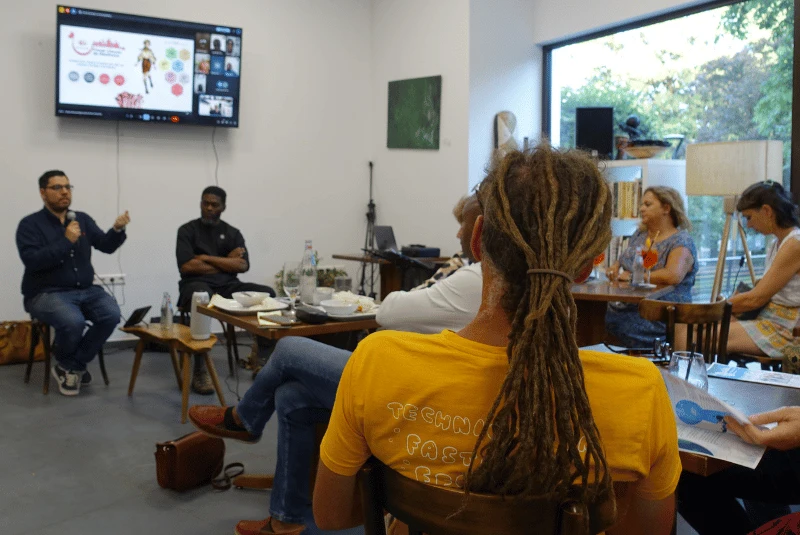


A hybrid event between Senegal, Togo, and Luxembourg.
On June 25th, we had the pleasure of hosting a unique hybrid conference connecting committed actors from Luxembourg, Togo, and Senegal around one essential question:
👉 How can a simple citizen diagnosis be transformed into truly transformative actions for ecological, social, and economic resilience?
Three inspiring initiatives served as the guiding thread for this collective exploration.
Three Territories, Three Rooted and Visionary Approaches
🇱🇺 In Luxembourg, Tarik Bouriachi recounted the story of the Äerdschëff, a public low-tech building constructed by the community using recycled materials like tires and earth. More than architecture, the Äerdschëff has become a living educational lab for resilience and technological sobriety. It also gave rise to the Citizen Resilience Fund (FCR), a framework that supports citizen initiatives across seven key areas – from food systems to governance.
🇸🇳 In Senegal, Constanze “Doudou” Sow introduced the Guélack Rural Ecological University, the fruit of 35 years of practice. Built on “learning by doing,” it fosters autonomy, holistic viability, and intergenerational learning through seven interconnected poles: agro-pastoralism, biodiversity, ecological memory, craftsmanship, water, income-generating activities, and more.
🇹🇬 In Togo, Sénamé Koffi Agbodjinou presented Hub-City, a network of neovernacular urban labs in working-class neighborhoods. These labs offer free training, support cooperative start-ups, and develop tangible tools like 3D printers made from e-waste, a plastic collection app, and a local currency (Scope) — all aiming for the vision of “one Earthship every two kilometers.”
From Vision to Action: A Recap of Our Transcontinental Conference on Citizen Resilience
Conference Summary
Common Threads: Resistance, Regeneration, Systemic Coherence
Several shared principles emerged from the discussions:
- Ecological transition as political resistance: not about blaming individuals, but transforming economic and institutional structures rooted in extractivism.
- Systemic coherence as a compass: rejecting fragmented solutions and instead embracing a holistic articulation of soil, water, energy, culture, and governance, along with transformative evaluation practices rather than rigid bureaucratic frameworks.
- Decolonizing imaginaries and technologies: with tools like forum theater, utopian fiction set in 2075, vernacular AI trained on community corpora, and smart-city models grounded in local context rather than global platforms.
- Youth as a central force: from open-source learning, mother-satellite farm networks, and code academies in urban neighborhoods to artistic and civic workshops in Luxembourg.
Challenges Faced, Solutions Emerging
The speakers also shared the real-life obstacles their initiatives face:
- Scaling challenges (e.g., Scope needs to collect 60 tons of plastic/day to be viable)
- Political or legal frameworks that hinder citizen-led cooperatives
- Social injustice in contexts of poverty
- The need for patient, open-ended funding models
Yet concrete pathways are emerging:
- Localize low-tech hubs and rural training centers
- Strengthen North–South alliances by linking urban labs, farms, and learning tools
- Expand participatory artistic formats to nourish regenerative imagination
- Deploy local currencies to support circular economies
- Co-develop impact dashboards that mix ecological regeneration with community vitality
A Growing Translocal Movement
The event powerfully confirmed the potential of grounded initiatives that combine low-tech, shared governance, and knowledge decolonization to enact real ecological transformation.
The Citizen Resistances & Resilience consortium positions itself as a facilitator of such translocal dynamics by:
- adapting pedagogical tools,
- supporting experimental networks,
- and creating citizen spaces for shared learning, mutual support, and scaled impact.
Because the transition begins where we are, with all those ready to reimagine what’s possible — together.

